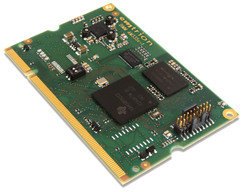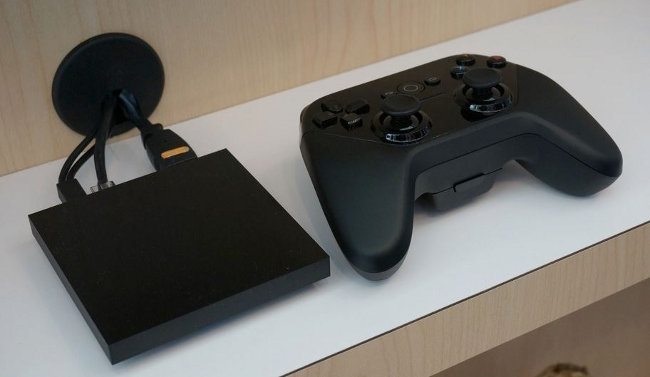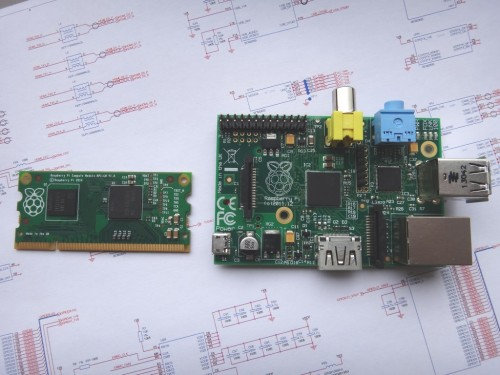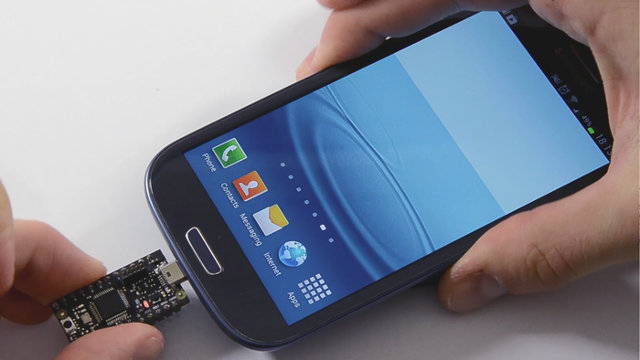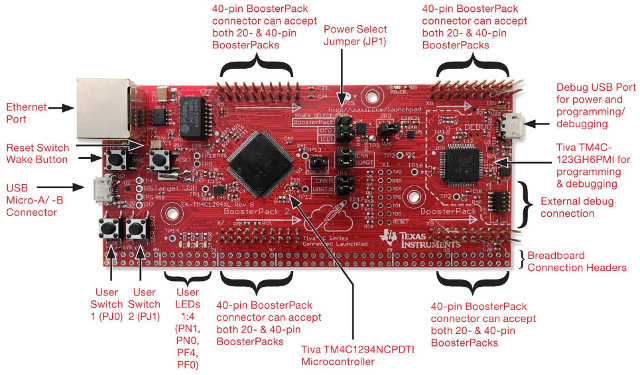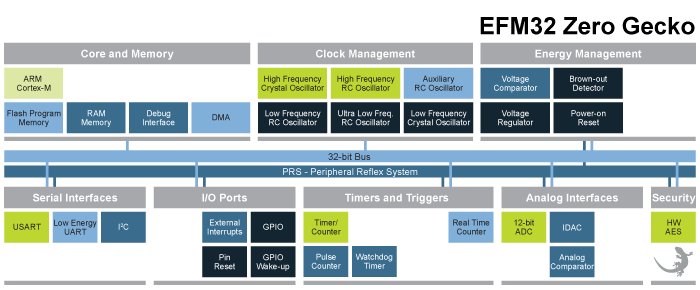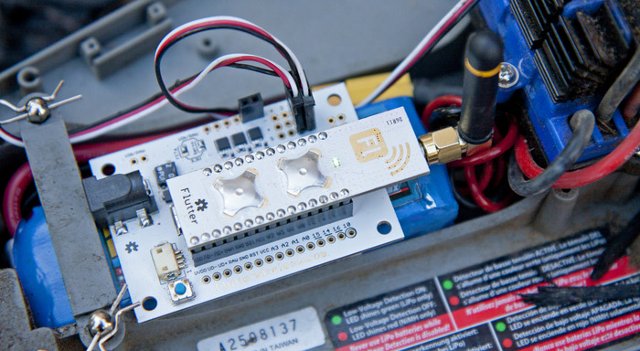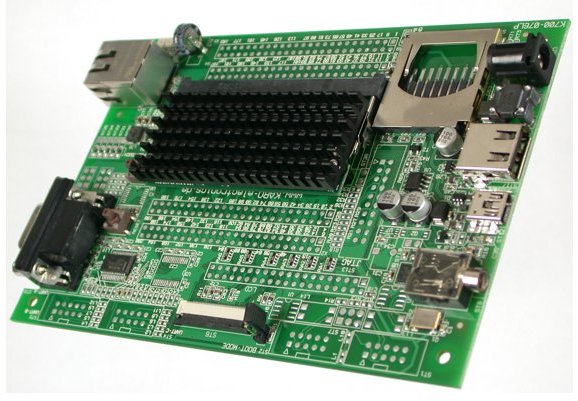When I cover system-on-modules (SoM), companies will usually provide some BSP (Board Support Packages) for older kernels, and did not submit their changes to mailine kernel, so I was interested in a news from Emtrion entitled “DIMM-AM335x: Linux mainline support ready“, which actually means they’ve done the work to support a recent Linux kernel (3.14) and provides instructions and code (device tree files), but did not submit patches to the linux-arm-kernel mailing list to get their changes added to kernel.org. Let’s look at the hardware specs first: SoC – Texas Instruments Sitara AM335x ARM Cortex A8 processor @ 720Mhz to 1GHz (AM3354 or AM3359) System Memory – onboard 512 MB SDRAM/optional 256 MB Storage – 512 MB NAND Flash (managed) + 2 SD card interfaces Display – LCDs I/F with resolution up to SVGA, with 4-wire touch interface Audio – Analog Audio with SSI I/F USB – USB 2.0 Host […]
ADT-1 Google’s Android TV Developer’s Kit Details
Google announced Android TV a few days ago, and distributed ADT-1 hardware development kit to application developers during Google I/O. I could not find much details at the time, except it was powered by Nvidia Tegra processors. I’ve now noticed some developers have posted a few pictures and the device, Phandroid has posted the specifications, and I’ve found some interesting hardware limitations for Android TV decided by Google that kill some potential applications for the TV. Here are known hardware specifications for ADT-1 devkit: SoC – Nvidia Tegra 4 System Memory – 2GB RAM Storage – 16GB flash Video Output – HDMI Connectivity – Ethernet, 2×2 MIMO dual-channel WiFi, Bluetooth 4.0 USB – 1x USB host port, 1x micro (custom?) USB port for power and ADB (via an Y cable provided with the kit) Dimensions – Small 🙂 This Android L Android TV box looks tiny and comes with G1 […]
Raspberry Pi Compute Module is a $30 Raspberry Pi Compatible System-on-Module
Albeit the initial goal of the Raspberry Pi board was to address computer science education, it has become extremely popular with hobbyists, has made its way in many different kinds of hardware, and is now clearly the number 1 low cost ARM Linux development board. The Raspberry Pi foundation has then decided to design and sell a system-on-module called Raspberry Pi Compute that people can use in actual products. Since the module will be mostly software compatible with the original Raspberry Pi board, the specs are similar: SoC – Broadcom BCM2835 ARM 11 processor @ 700 MHz with Videocore IV GPU System Memory – 512MB RAM Storage – 4GB eMMC Flash SoM Connector – DDR2 200-pins SODIMM Dimensions – 67.6x30mm board which fits into a standard DDR2 SODIMM connector The main difference is they’ve replaced the SD card slot found in the board, by an eMMC module which is more […]
USB2Go ARM Cortex M3 Development Board for Android Smartphones (Crowdfunding)
Many MCU based development boards such as Arduino or mbed platform connect to a computer via USB for power and programming, at least during the development stage. USB2Go, however, is designed with a micro USB port to connect directly to your Android smartphone, although it can also be used for standalone project, and an Arduino compatible baseboard is also available. This board powered by an STM32 ARM Cortex M3 MCU is however mainly destined to interface hardware such as LED, servos, sensors to your smartphone via micro USB providing both power and a communication channel with your Android device. USB2Go hardware specifications: MCU – STMicro STM32 ARM Cortex M3 MCU @ 72 MHz with 128 KB Flash, 64 KB SRAM USB – Micro USB for power and programming Headers – 2x 12 pin headers giving access to GPIO, ADC, PWM, UART, I2C, SPI… Debugging I/F – JTAG 20-pin to SWD […]
Texas Instruments Tiva C Series TM4C1294 Connected Launchpad Sells for $20
There are now many ultra low cost MCU development kit selling for $15 to $25 such as STMicro Discovery Board, but for this price, they’ll usually just feature the MCU, a micro USB, pin header, maybe and maybe some sensors, and they usually lack any form of connectivity, at least without extra hardware. With Tiva C Series TM4C129 Connect Launchpad, Texas Instruments brings a board that can be used for IoT application out of the box thanks to the addition of an Ethernet port. The board sells for just $19.99, which means you could easily make something like a connected 4-relay control system for about $25. Connected LaunchPad evaluation kit specifications: MCU – Texas Instruents TM4C1294NCPDT ARM Cortex-M4 @ 120MHz with floating point, 1MB Flash, 256KB SRAM, 6KB EEPROM, Integrated 10/100 Ethernet MAC+PHY, data protection hardware, 8x 32-bit timers, dual 12-bit 2MSPS ADCs, motion control PWMs, USB H/D/O, and many […]
Silicon Labs Unveils EFM32 Zero Gecko MCU Family Based on ARM Cortex M0+
Silicon Labs, who bought Energy Micro earlier this year, has recently introduced a new family of 32-bit MCU based on ARM Cortex M0+ called EFM32 Zero Gecko, as well as the corresponding starter kit. These ultra low power MCUs (currently 16 products) are destined to be used in IoT applications such as mobile health and fitness products, smart watches, activity trackers, smart meters, security systems and wireless sensor nodes, as well as battery-less systems powered by harvested energy. The key features of this family include: ARM Cortex-M0+ core @ 24 MHz 4kb to 32 kB flash and 2kb to 4 kB RAM memory 17 to 37 GPIO Single 1.85–3.8 V power supply 5 Power modes Hardware AES (Some models only) -40° to 85 °C operation range Package options: QFN24, QFN32 and QFN48 EFM32ZG222F32, the Zero Gecko MCU with the most memory and features, has the following specifications: ARM Cortex-M0+ CPU […]
$25 Flutter is a Wireless Arduino compatible Board with Up to 1 km Range
There are already several ways to add wireless connectivity to your hardware project. For short ranges, we can use protocols such as Bluetooth (e.g. RFDuino, BLEDuino projects, or Bluetooth USB dongle), for much longer ranges 3G/4G connectivity may be required, and achievable via a 3G/4G USB dongle, or SparqEE CELLv1.0 project for example. But what if you want something in the middle with a range closer to 1km? Flutter boards using the 915MHz band (US only) can provide such range, and are software compatible with the Arduino. There are two version of the board: Flutter Basic – Board with an low-profile integrated antenna. It features micro USB for power, an LED, and a button, as well as several digital and analog I/O. Flutter Pro – Board with external antenna (and probably longer range). It comes with all features found in Flutter Basic, and adds battery charging, an additional button, and […]
$200 Direct Insight Triton-TXEK EvalKit for iMX6 Features Freescale i.MX 6Quad Processor
With Wandboard Quad, SABRE Lite, Nitrogen6X, and UDOO, we already have some choices when it comes to low cost Freescale i.MX 6Quad development platforms. Direct Insight, a British company, has developed another called TRITON-TXEK EvalKit for iMX6 that includes the company’s Triton-TX6Q SoM, for 130 GBP (about $200). TRITON-TXEK for iMX6 Specifications: Specifications listed for the Triton-TXEK evaluation kit include: SoC – Freescale i.MX 6Quad quad core Cortex-A9 @ 1GHz with Vivante GC2000 GPU System Memory – 1GB DDR3 Storage – 128MB NAND flash + SD card slot Display – TFT panel via 40-pin LCD flat cable header Connectivity – 10/100M Ethernet USB – USB 2.0 host + mini USB 2.0 host/device Serial – RS232on D-Sub connector Audio – 3.5mm headphone jack Power Supply – 5V Dimensions – Module: 68mm × 31mm, Baseboard: Who knows… Operating temperature – -20 to 70°C Since the only easily accessible display option is the […]


